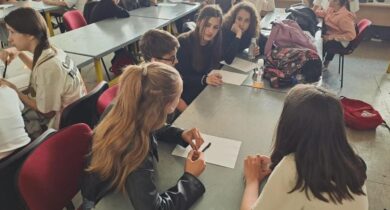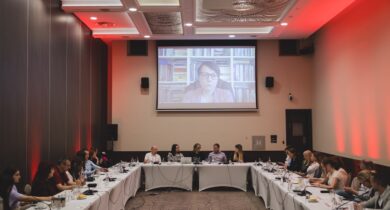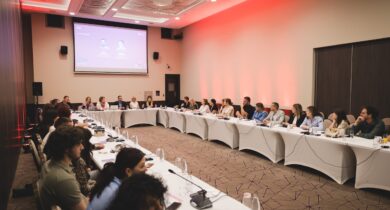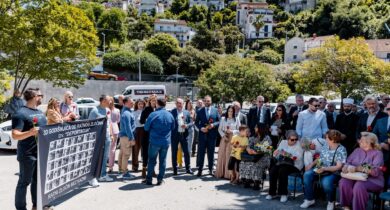The silence of institutions or their behaviour as if they were a party service induced and demonstrated the justification of protests following the tragedies in Montenegro, Serbia, and North Macedonia, but also further weakened citizens’ trust in institutions, it was assessed in PROUDCAST, it was assessed in PROUDCAST, jointly produced by the MINA agency, the… »
Actual
Civic Education Inspires Youth to Actively Participate in Society
Centre for Civic Education (CCE), Human Rights Action (HRA), and the Centre for Women’s and Peace Education – ANIMA successfully conducted six workshops on civic education and human rights over the past month for elementary and high school students in Bijelo Polje, Cetinje, Ulcinj, Podgorica, Bar and Pljevlja. During these inspiring workshops, young participants had… »
Party, Protocol and PR Ahead of Genuine Reforms
Centre for Civic Education (CCE) has been continuously highlighting, for nearly a decade, the inefficiency of the organization of the executive branch in Montenegro. The current structure, with a record 32 members and overlapping responsibilities, represents an absurd and unnecessary burden on public resources, as an outcome of balancing party interests. Through a series of… »
Joint steps towards strengthening the role of youth in montenegro
“Investing in youth is not an expense, but a crucial investment in democracy and in a more sustainable and just future for Montenegro”, was emphasized during the signing of contracts with five civil society organizations (CSOs) whose projects have been supported within the framework of the call for CSO project proposals in Montenegro. This initiative… »
Citizens Have the Right to Demand Accountability
The authorities are increasingly treating legitimate critics as criminals and trying to label public criticism as unlawful, this was one of the key messages from the second session of the conference Civic Mobilization as a Response to Institutional Deficit, organized by the Centre for Civic Education (CCE) and the Friedrich Ebert Stiftung (FES). During the panel “The Voice… »
Civic Mobilization as a Response to the Loss of Trust
In Montenegro, protest culture is still in the making, and it is developing painfully slowly, especially when it comes to protests with a civic and progressive character, said Daliborka Uljarević, Executive Director of the Centre for Civic Education (CCE), during the conference Civic Mobilization as a Response to Institutional Deficit, organized today by CCE and… »
Meeting held regarding the initiative to erect a memorial to the victims of the 1992 deportation
On Monday, 26 May 2025, a meeting was held at the Municipality of Herceg Novi regarding the initiative of non-governmental organizations Action for Human Rights (HRA), the Centre for Civic Education (CCE), and the Center for Women’s and Peace Education ANIMA, for the erection of a memorial to the victims of the 1992 deportation. The… »
The Unfinished Story of the Murder of Duško Jovanović – A Test Montenegro Continues to Fail
Centre for Civic Education (CCE) reminds that today marks 21 years since the murder of Duško Jovanović, Editor-in-chief of the daily newspaper Dan. This murder is not only a painful reminder of unresolved political violence with a tragic outcome, but also a serious test of the institutional maturity of Montenegrin society – a test that,… »
33 years since the unpunished war crime of the deportation of Bosnian refugees – Herceg Novi officials promise memorial for the victims
A memorial gathering was held yesterday at noon in front of the Herceg Novi police station to mark the 33rd anniversary of the war crime involving the deportation of Bosnian refugees. The event was organized by the Human Rights Action (HRA), the Centre for Civic Education (CCE), and ANIMA – Center for Women’s and Peace… »
The “Zmajević” Case in Documents: From War Crime to Final Conviction
Centre for Civic Education (CCE), as part of its ongoing efforts to provide a detailed insight into the facts related to prosecuted war crimes cases, has published a new compilation of court documents from the case known as “Zmajević”. Through this publications, CCE offers to interested public, researchers, journalists, and legal professionals access to materials… »










